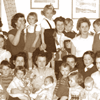Home > War Bride Stories > Rosalind Elder Newfoundland
 |
| Click here for larger image. Newfoundland War Brides from the St. John's "Rose and Thistle Club" Christmas 1950. Photo courtesy of Rosalind Elder. |
The Ile de France sailed from Southampton docks on April 2, 1946. On board were five thousand Canadian servicemen, thirty war brides and their husbands. It had been an emotional farewell at the dockside for the young women. Canada was a far country, six days by ocean liner, a long way from family and friends. Back then no one could visualize the ease in which such a journey would be undertaken in the years ahead. This shipment of war brides did not include children, just the wives of The Newfoundland Forestry Unit members.
The women had separate quarters on board ship, joining their husbands at breakfast. We passed the time during the day by strolling the decks and chatting throughout the long voyage. The ship was overcrowded; the troops slept in hammocks below decks, wall to wall soldiers. Uncomfortable certainly, but I expect the men were happy to be homeward bound at long last.
A number of the wives were pregnant; including myself; and between seasickness and nausea, it was not a pleasure cruise. Our meals were served twice daily, a terrific menu, lavishly displayed on elegant tables, white linen tablecloths no less.
Fire drill was our only activity, no snooker, quoits or shuffleboard on board for entertainment. Reading , playing cards and holding long conversations about our plans for the future seemed to be the only past time. Our lives had been focused on war; peacetime was an unknown factor to many of us. A number of the returning soldiers talked of broken marriages, hasty weddings before their departure overseas, others of sweethearts left behind, and friends who would not be returning home.
It was a pleasant surprise to many of the warbrides that we could purchase whole cartons of chocolate bars in the ship's canteen. Rationing was over; most of us scarcely remembered pre-rationing days in Britain . Sailing into the harbour towards the city of Halifax , Nova Scotia , everyone went out on deck to catch a glimpse of the Canadian shoreline. It looked welcoming, but foreign. Halifax in those days was drab and gray; the wooden houses resembled apple crates turned upside down. The pier looked like a cattle shed, not a promising sight. To add to our dismay it was cold, windy and bleak. It had looked better from the distance.
Some of the passengers had gone ashore, most of us stayed on board. Several came back to report that the clothing stores had outdated styles and "old lady shoes." we thought they were at least 50 years behind the U.K. which proved to be correct on further experience. Bright and early the next morning the troops were marched to their trains, some for the Canadian West, others to Ontario.
The trains were huge in comparison to our small British ones, with horns that had such a melancholy wail; it would bring tears to your eyes. We were greeted by the worthy ladies of the Canadian Red Cross, who shepherded us through customs and onto the waiting trains that were to take us to North Sidney , Nova Scotia . I must confess that I had some misgivings about my new life, and felt more than a little apprehensive about the reception ahead. We had heard tales about some of the Canadian girls who had been left behind during the war and that they were none too pleased about our arrival.
On reaching North Sidney , we were dispersed to several hotels to stay overnight. It was something of a shock when we were assigned two couples to a room. Of course, this was refused and we tossed a coin to see which couple would seek other accommodation. We won the toss and remained at the hotel.
The volunteers, who had assisted us throughout the land journey, arranging meals, locating baggage and handling the paper work, did a commendable job in undertaking the enormous task of welcoming the newcomers to Canada , the Red Cross was especially helpful. Everyone was delighted to be on terra firma once more.
However, it was not for long. The Cabot Straits lay ahead. "The stormiest crossing in years," said the sailors, as the vessel heaved its way across the Gulf of St. Lawrence, It was a long sleepless night for most of us, it was a much subdued group of travelers who rushed on deck at six a.m. the next morning to catch sight of the Newfoundland coastline. There it was looming ahead, fogbound, forbidding, the ominous rock! My heart sank, as I'm sure did most of the other war brides. There was no turning back now, we put on a brave face and hoped for the best.
Docking at Port-Aux-Basque in the dense fog, it was difficult to make out the figures of the longshoremen, wearing their oilskins, logan boots and sou'westers.
Snow was everywhere; the ship had sailed from springtime back into winter.
No one spoke, the silence hung heavy. The Newfie bullet awaited. It ran on a narrow gauge railway track three and a half feet wide and made the three hundred mile trip to St. John's in seventy-two hours. The stewards were friendly, helpful and cheerful, the menu consisted of Newfie fare, cod tongues, brewis, scrunchions, trout, bakeapple jam and a salt beef dinner. The returning veterans were as pleased as punch to once again enjoy the type of food they had grown up with. It tasted o.k.to us after all we would soon have to learn to cook it.
The scenery was bleak, rocks, barrens, and endless snowdrifts. However, inside that train was the real Newfoundlanders, at home in their native land, kindly, humorous and generous. As the train chugged its way across the country numerous stops were made at quaint sounding places like Goobies, Come -by-Chance, and Topsail. When the passengers alighted at their destinations, they took a last look back at the train as it pulled away, the final link with home and with those who had shared a common bond.
St. John's railway station was a hive of activity, what an affectionate welcome the veterans received from their families, most of whom had been overseas for the entire six years of the war. It was an apprehensive moment for the wives, uncertain as to their acceptance but for most, it was a pleasant experience.
The drive along Water Street , which was the main thoroughfare, passed several stores as they called them, not shops as in Britain . Bowring's, Ayre and Sons, the Bon Marche, The London New York and Paris, no supermarkets in those days most of the grocery stores were corner shops.
The local fishermen called at your front door weekly selling codfish and cod roes, 25 cents for a full fish. A fresh salmon cost $1.00 if you went down to Portugal Cove where the fishermen sold them. We often went down on a Sunday to scoop up basinfuls of capelin when they washed ashore.
The Cathedral was the tallest building in the city. Life was pretty rugged back then in Newfoundland , houses seemed to cling to the sides of cliff faces, steep hills everywhere and many homes with no indoor plumbing. I soon learned what “the midnight patrol” meant. All of the water to his father's home on Signal Hill was carted uphill in buckets, a primitive lifestyle and a set back for me coming from a big city in Scotland . I decided to move out as soon as possible, which we did.
His parents spent a lot of time in the church, and his father spent a lot of time in the liquor store. As mother in laws go she was very good, and I rather liked her, at any rate we got along very well. She taught me how to make bread from yeast, and toupins. Dough fried in the morning from the mixed dough raised overnight.
During the summer months, we could forget the travails of life and enjoy the good times. Fishing in the many ponds as they called their lakes, trout fishing in water so crystal clear we drank from it, berry picking for cranberries, blueberries and bakeapples. We went down to the sea often to gaze towards the horizon and visualize the coastline of Scotland . In time, we all became involved with the business of raising families, setting up house, and the men finding jobs.
The local war brides formed the “Rose and Thistle Club” we enjoyed meeting in the afternoons, celebrating every occasion together, Christmas, Halloween, and any other social occasion we could come up with. The Newfoundland women were kindness itself, good hearted and fun loving; terrific bakers, their dark fruitcake, loaded with cherries, raisins, nuts, molasses and spices was a treat. Especially accompanied by a quaff of homemade blueberry wine.
Being invited to a "Time” which was another name for a party, meant a "scoff," with salt beef dinner, peas pudding and steam duff. There was lots of singing, dancing and music of the homemade variety, a winter's evening activity with the more people the merrier. As it turned out, life did become quite enjoyable, although I had often felt that I'd taken a step back in time things did improve gradually.
My husband found a good job; we prospered and had a family of our own. We were transferred to Nova Scotia in 1959 by his company, and again in 1966 to Ontario . At that time, it was for the best as employment was scarce in St. John's and we knew that one day our children would leave, this way we went ahead before they did. We spent 13 years in Newfoundland and after the move to Ontario he passed away. I married once more this time to a Scotsman from my own home town, we retired to British Columbia some 20 years ago and are living happily ever after.
Perhaps Newfoundlanders no longer boil the kettle and fry freshly caught trout by the side of a "pond" as we did, but then again maybe they do. I bet they no longer use the old sayings like "bound you will." And the Newfoundlander's toast
I bows towards you,
I nods accordant.....
I catches your eye and I smiles
Contributed by Rosalind Elder, author of Maples and Thistles
Click on these websites to see more from Rosalind Elder
Women's Timber Corps
Women's Timber Corps photos
Women's Land Army Timber Corp at Work
Lumberjills of Scotland
Some of the Lumberjills
Wartime Memories Project: The Women's Land Army
|
 |




